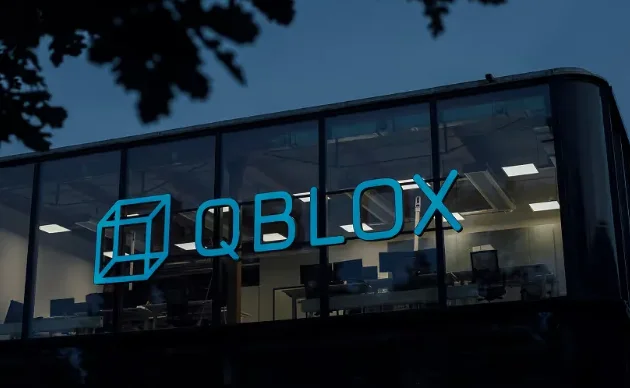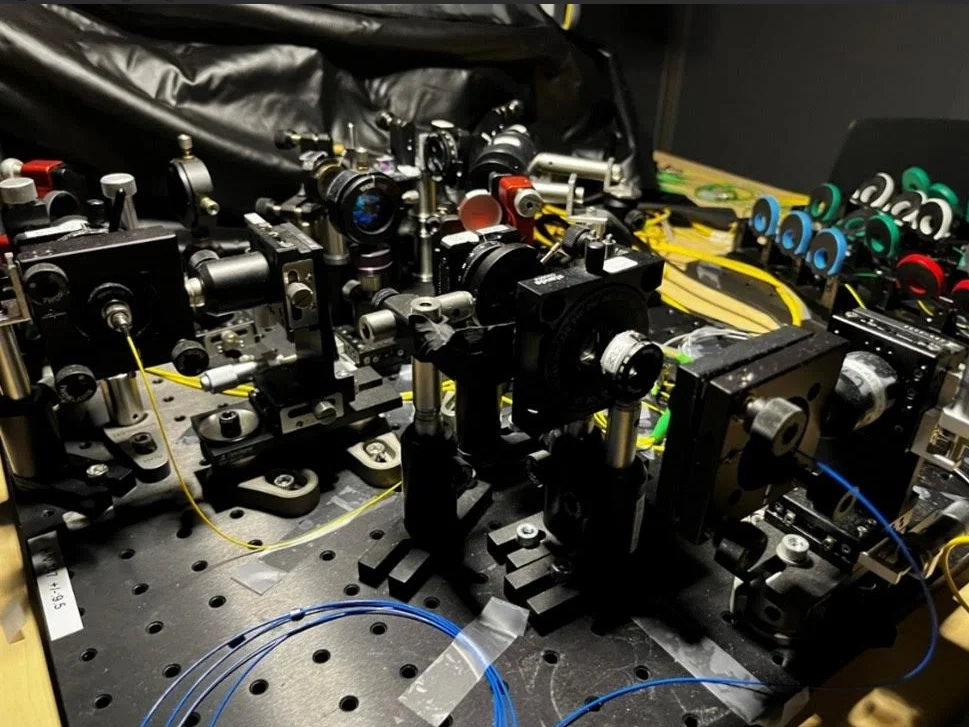Insider Brief
- Connecticut will invest $50.5 million in New Haven to build facilities and infrastructure aimed at advancing artificial intelligence, quantum technology, and other emerging fields.
- The funding includes $10 million for QuantumCT, a UConn- and Yale-led initiative launched in 2022 to accelerate quantum research, commercialization, and workforce development.
- UConn’s QuantumCT proposal was recently named a finalist in the National Science Foundation’s Regional Innovation Engines Program, which could provide up to $160 million in additional federal support.
- Image: QuantumCT’s expansive partnership includes UConn, Yale, state government, and more in the public and private sector. Pictured: Yale Vice Provost for Research Michael Crair, Gov. Ned Lamont, Winstanley Enterprises Principal Carter Winstanley, UConn Vice President for Research, Innovation, and Entrepreneurship Pamir Alpay, and QuantumCT President Albert Green. (Allaire Bartel).
Gov. Ned Lamont announced that the state will commit $50.5 million to infrastructure projects in downtown New Haven, a move intended to position the city as a hub for artificial intelligence, quantum research and other emerging technologies. The investment is part of the Connecticut Innovation Clusters Program, a new initiative to boost the state’s economic development by linking research institutions with businesses and communities, according to a university news article.
Of the total package, $10 million is earmarked for QuantumCT, a joint initiative launched in 2022 by the University of Connecticut and Yale University. QuantumCT’s goal is to accelerate research and commercialization of quantum technologies, ranging from advanced computing to new materials and sensors. The program has backing from state government, local municipalities and private industry.
“Every day in downtown New Haven, workers are developing the cutting-edge research, technologies, and products that are changing the world and propelling Connecticut forward as a leader in the fields of life sciences and quantum technologies,” Governor Lamont said, according to the university website. “We want to build on this foundation, encourage new growth, and further cement New Haven’s reputation as a groundbreaker in these sectors. These targeted investments in the downtown neighborhood’s public infrastructure and facilities will enable us to further partner with these businesses and accelerate job growth and more opportunities here in Connecticut.”

Officials see UConn and Yale as central to the strategy. UConn’s expertise spans applied research areas such as manufacturing, sensor development and translational science, while Yale has built a strong base in quantum information and superconducting qubit research. By combining the two, the state hopes to develop both new technologies and the workforce needed to sustain them. The Governor’s Office and the Department of Economic and Community Development (DECD) identified the institutions as anchors of what is being called the New Haven Innovation Cluster.
“Connecticut has one of the nation’s strongest concentrations of early adopters of quantum technologies, positioning the state as a leader in this emerging field,” said Pamir Alpay, vice president for research, innovation, and entrepreneurship for UConn. “By working closely with industry partners, we are advancing near-term applications that will lay the foundation for a quantum-enabled future.”
Michael Crair, Yale’s vice provost for research, also touted the investment’s potential to help grow Connecticut’s quantum sector.
“This investment will allow Yale, UConn, the City of New Haven, and our partners to accelerate the translation of quantum and bioscience research into applications that benefit Connecticut’s communities and economy,” said Crair. “By building shared infrastructure and training the next generation of innovators, we can ensure that quantum technologies take root and grow here in Connecticut. It’s an exciting step forward for our city and state.”
Project List
The full $50.5 million is earmarked for the following projects and organizations:
- $10 million for QuantumCT to provide financial support for its nonprofit entity, including quantum computing infrastructure and testbed deployment
- $17.5 million in public infrastructure improvements to support development, including stormwater management and climate-resistant mobility
- $14.5 million to facilitate development of a 200,000-square-foot facility for the city of New Haven and 277,000-square-foot planned life sciences building on the site of the former New Haven Coliseum
- $4.2 million for a multi-pedestrian corridor connecting Union Station to downtown
- $3 million to BioCT to activate programming within the cluster
- $1.3 million to create a 4,500-square-foot New Haven Innovation Center
The state announcement follows another major development for QuantumCT. Earlier in September, UConn’s proposal to the National Science Foundation’s Regional Innovation Engines Program was named a finalist. If awarded, the initiative could bring as much as $160 million in federal support to Connecticut. The funds would go toward developing quantum-related technology, building a talent pipeline, and strengthening ties between academic research and private-sector adoption.
The NSF program is one of the largest federal efforts aimed at building regional tech hubs. UConn and Yale are scheduled to host a site visit from the agency in December, and final decisions are expected in early 2026. The combination of state and potential federal backing underscores the growing national competition to secure leadership in quantum science, an area widely viewed as transformative for sectors such as health care, logistics, energy, and defense.
Building the Research Network
QuantumCT builds on UConn’s Quantum Alliance, a grass-roots network that coordinates more than 75 faculty members active in quantum science and engineering across all university campuses, including UConn Health. The alliance focuses on fostering collaboration, promoting discovery, and strengthening training opportunities for students entering the field. Its mission is to expand Connecticut’s role in quantum innovation while supplying highly trained professionals to a rapidly growing industry.
State leaders argue that investing in this infrastructure creates a multiplier effect, helping to attract private companies and further federal grants. Quantum technologies are still in their early stages of development, but policymakers see long-term potential in areas such as secure communications, new types of computing, and advanced sensing systems. By investing now, Connecticut aims to position itself as a first mover.














